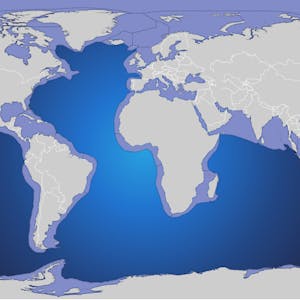Large Marine Ecosystems Assessment and Management
Focusing on the Large Marine Ecosystems (LMEs) of the world, this course will introduce the concept and practice of ecosystem-based management. LMEs occupy areas of coastal ocean at least 200 000 km² or greater in size. These coastal waters produce 12.6 trillion USD in ecosystem goods and services annually and are vitally important for billions of people around the globe.Because LMEs are bounded by ocean features and are globally linked, management of human activities needs to occur in an integrated fashion across political boundaries and economic sectors (e.g. fishing, shipping, energy, tourism, and mining.) This represents a new type of management approached - shifting from single sector-based to multi-sector assessment and management within the spatial domain of the world’s 66 Large Marine Ecosystems. There is global high-level support for this new approach and in this course, we will introduce the concepts and tools for assessing and managing LMEs.
Together, leaders and experts in a global movement to recover and sustain the goods and services of LMEs will introduce you to the mechanisms used for assessment (Transboundary Diagnostic Analysis), planning and implementation (Strategic Action Programme). Based on recent activities in implementation and practice of the LME approach in 22 projects around the globe, we will showcase examples of effective management at this scale, and highlight the challenges and issues. By the end of the online course, we hope you will be able to actively use this knowledge to advance sustainable development of the world’s oceans.
The course was created with the support and input of: the Global Environment Facility (GEF), the United Nations Development Program (UNDP), the National Oceanic and Atmospheric Administration (NOAA), UNESCO-IOC and IW:LEARN.
None
Syllabus
Syllabus - What you will learn from this course
Week 1
What is the Large Marine Ecosystem Approach?
Week 2
The Three Natural Science Modules
Introducing the Large Marine Ecosystem approach, ecosystem based management principles, and the five modules. There are three topics covered in this first week - ecosystem-based management, the concept of Large Marine Ecosystems, and the 5-module approach to assessment and management. As well as my lectures, there are also summaries of some key readings and links to other resources. We’ve included practice quizzes to help you recap and test your understanding of the key concepts as we move through the lessons. There is one graded quiz at the end of the week, which carries marks - but you may take the quiz more than once. At the end of this week, and all the other weeks, Dr Kenneth Sherman will share his insights about the topics we have covered.
Week 3
The Two Human Dimension Modules
In this week, we deal with the three natural science modules within the five module approach.
Week 4
Tools and Actions: the Transboundary Diagnostic Analysis and the Strategic Action Programme
Week 5
Transboundary Marine Ecosystem-Based Management
Week 6
Taking it Home: Examples of Best Practice
FAQ
When will I have access to the lectures and assignments?
Access to lectures and assignments depends on your type of enrollment. If you take a course in audit mode, you will be able to see most course materials for free. To access graded assignments and to earn a Certificate, you will need to purchase the Certificate experience, during or after your audit. If you don't see the audit option:
What will I get if I purchase the Certificate?
When you purchase a Certificate you get access to all course materials, including graded assignments. Upon completing the course, your electronic Certificate will be added to your Accomplishments page - from there, you can print your Certificate or add it to your LinkedIn profile. If you only want to read and view the course content, you can audit the course for free.
Is financial aid available?
Yes. In select learning programs, you can apply for financial aid or a scholarship if you can’t afford the enrollment fee. If fin aid or scholarship is available for your learning program selection, you’ll find a link to apply on the description page.
Reviews
Not only was this an incredibly informative course but it gives me hope about the future of our oceans. It's exciting to hear about all of the collaborative work going on within and between nations.
Great course but the volume levels of the videos need to be adjusted. Difficult to hear even at maximum volume.
a very good tool in helping developing countries like the Philippines create a sustainable law on Marine Protected Areas and its implementation
This is really an excellent course particularly those who are interested in marine ecosystem-based management. I will surely recommend it to my friends and colleagues.
